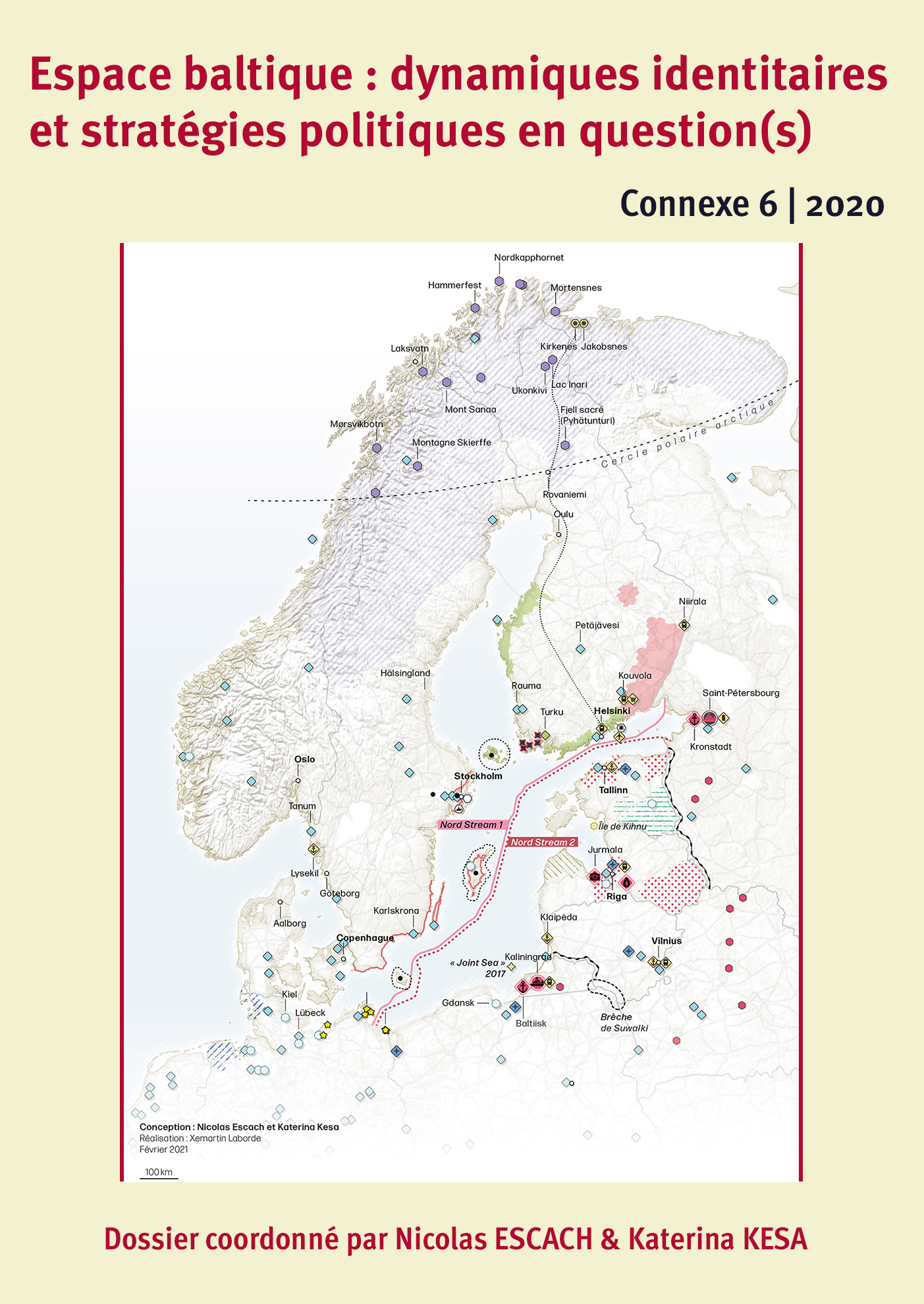La Finlande et la Suède, des pays non-alliés ? Cultures et politiques de sécurité à l’épreuve des tensions régionales dans l’espace baltique
DOI :
https://doi.org/10.5077/journals/connexe.2020.e343Mots-clés :
Finlande, Suède, neutralité, non-alliance, culture de sécuritéRésumé
« Petits pays » d’Europe du Nord, la Finlande et la Suède ont chacune fait le choix de la neutralité pour assurer leur sécurité dans un contexte où elles se sentaient fragilisées par leur voisinage avec la Russie. Après l’effondrement de l’Union soviétique au sortir de la Guerre froide, elles ont mené une politique originale, associant la participation pleine et entière à la politique étrangère et de sécurité commune de l’Union européenne et la non-participation à des alliances militaires. Toutefois, bouleversant en profondeur l’équilibre en Europe du Nord, la crise ukrainienne a conduit la Finlande et la Suède à prendre leurs distances avec l’objectif de neutralité dans un conflit armé, qui avait été au cœur de leur politique sécuritaire depuis les années 1950. Par-delà ce qui apparaît comme une rupture avec leur tradition sécuritaire, la Finlande et la Suède demeurent en réalité fidèles à leur culture de sécurité : comme par le passé, c’est l’image qu’elles ont chacune d’elles-mêmes, une image demeurée inchangée, qui continue d’encadrer leurs choix sécuritaires.
Références
The Advisory Board for Defence Information (ABDI) (MTS). January 2020. “Finns’ Opinions on Foreign and Security Policy, National Defence and Security”.
Archer, Toby. 2003. “Keeping out of it: the hangover of Finnish neutralism and the limits of normative commitments. Why are Finns so disinclined to allow Finnish troops to be used elsewhere?” Yearbook of Finnish Foreign Policy 2003: 57-70.
Baltic Monitor. 05.06.2019. “Finland’s new coalition government stance on security: to focus less on Russia and war”. Warsaw Institute Foundation.
Browning, Christopher S. 2002. “Coming home or moving home? ‘Westernizing’ narratives in Finnish foreign policy and the reinterpretation of past identities”. Cooperation and Conflict XXXVII (1): 47–72.
Clerc, Louis. 2005. « La Finlande entre OTAN et incertitude russe ». Nordiques 7 : 22–47.
Euractiv.10.04.2015. “Nordic nations agree on defence cooperation against Russia”.
Fagan, Moira, and Jacob Poushter. 09.02.2020. “NATO seen favorably across Member States”. Pew Research Center (Global Attitudes and Trends).
Ganser, Daniele. 07.04.2005. “The secret side of international relations: An approach to NATO’s stay-behind armies in Western Europe”. Leeds: 55th annual conference of the Political Studies Association.
Goetschel, Laurent. 1998. “The foreign and security policy interests of small States in today’s Europe”. In Laurent Goetschel (dir.). Small States Inside and Outside the European Union. Interests and Policies, 13–31. Boston: Kluwer Academic Publishers.
Goetschel, Laurent.1999. “Neutrality, a really dead concept?” Cooperation and Conflict XXXIV (2): 115–139.
Håkan, Malmqvist. 2018. “Sweden and NATO – 23 years down the road.” NATO Review Magazine.
Heikka, Henrikki. 2005a. “Republican realism. Finnish strategic culture in historical perspective”. Cooperation and Conflict XL (1): 91–119.
Heikka, Henrikki. 2005b. « La défense de l’hégémonie occidentale : un point de vue finlandais ». Nordiques 7 : 49–64.
Kaldor, Mary. 2018. Global Security Cultures. Cambridge/Medford: Polity.
Katzenstein, Peter J. (dir.). 1996. The Culture of National Security. Norms and Identity in World Politics, 1–32. New York: Columbia University Press.
Linde, Ann. 12.02.2020. “The government’s statement of foreign policy 2020”. Stockholm.
Longhurst, Kerry. 2004. Germany and the use of force. Manchester/New York: Manchester University Press.
Miles, Lee. 1995. Sweden and European Integration. Hants: Ashgate.
Ministry for Foreign Affairs. 29.04. 2016. “The Effects of Finland’s Possible NATO Membership. An Assessment”. Helsinki.
Molin, Karl. 2000. “The central issues of Swedish neutrality policy”. In Michael Gehler und Rolf Steininger (dir.). Die Neutralen und die europäische Integration. 1945 bis 1995, 261–275. Vienne/Cologne/Weimar: Böhlau.
MSB. 18.12.2018. Opinioner 2018.
Nevakivi, Jukka. 1989. “Independent Finland between East and West”. In Max Engman and David Kirby (dir.). Finland People, Nation, State, 128–145. London: Hurst & Company.
Niinistö, Sauli. 25.08.2015. “Speech by President of the Republic at the Ambassador seminar”.
Nünlist, Christian. 2013. « La Suède aux prises avec sa politique de défense ». Politique de sécurité : analyse du CSS 138.
Prime Minister’s Office. 09.2016. Government Report on Finnish Foreign and Security Policy.
Rapport du Comité parlementaire de défense. 2008/2009. FöU10. Försvarets inriktning.
Report by the Council of State to the Parliament. 06.06.1995. “Security in a Changing World: Guidelines for Finland’s Security Policy”.
Report by the Council of State to the Parliament. 17.03.1997. “The European Security Development and Finnish Defence”.
Rinne, Antti. 11.06.2019. “Prime Minister in Parliament on the Government Programme”. Helsinki.
Sakerhetspolisen.se. 2018. Swedish Security Service 2018 Yearbook.
Simons, Greg, and Andrey Manoilo. 2019. “Sweden’s self-perceived global role: Promises and contradiction”. Research in Globalization vol.1.
Stütz, Göran. 2005. Opinion 2005. En opinionsundersökning från Stylrelsen för psykologiskt försvar 2005. Stockholm: Styrelsen för psykologiskt försvar.
Sydow, Björn von. 04.04.2018. « Résilience : la Suède planifie la “défense totale” ». NATO Review.
Szymanski, Piotr. 20.03.2020. “The Northern tandem. The Swedish-Finnish defence cooperation”. OSW Commentary.
“The Agreement of Friendship, Cooperation, and Mutual Assistance between The Union of Soviet Socialist Republics and The Republic of Finland”.
Thibaut, Françoise.1990. La Finlande. Politique intérieure et neutralité active. Paris : LGDJ.
Wallström, Margot. 24.02.2016. “Statement of Government Policy in the Parliamentary Debate on Foreign Affairs 2016”.
Winnerstig, Mike. 2001. “Sweden and NATO”. In Bo Huldt, Teija Tiilikainen et al. (dir.), Finnish and Swedish Security. Comparing National Policies, 76–91. Stockholm: Swedish National Defence College / The Programme on the Northern Dimension of the CFSP.
Téléchargements
Publié en ligne
Rubrique
Comment citer
Licence
Certains droits réservés 2021 Sophie Enos-Attali

Ce travail est disponible sous la licence Creative Commons Attribution 4.0 International .




